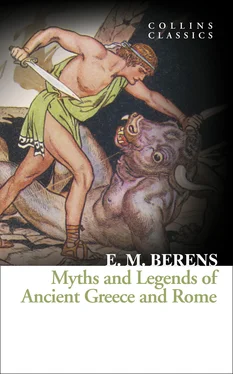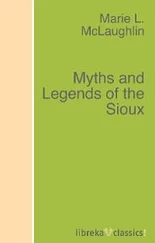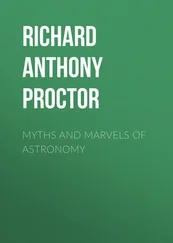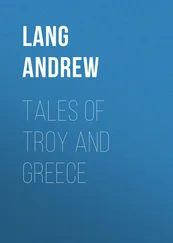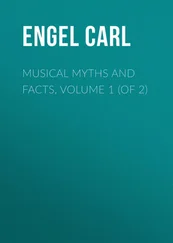And now a few words will be necessary concerning the religious beliefs of the Romans. When the Greeks first settled in Italy they found in the country they colonized a mythology belonging to the Celtic inhabitants, which, according to the Greek custom of paying reverence to all gods, known or unknown, they readily adopted, selecting and appropriating those divinities which had the greatest affinity to their own, and thus they formed a religious belief which naturally bore the impress of its ancient Greek source. As the primitive Celts, however, were a less civilized people than the Greeks, their mythology was of a more barbarous character, and this circumstance, combined with the fact that the Romans were not gifted with the vivid imagination of their Greek neighbours, leaves its mark on the Roman mythology, which is far less fertile in fanciful conceits, and deficient in all those fairy-like stories and wonderfully poetic ideas which so strongly characterize that of the Greeks.
FIRST DYNASTY.
ORIGIN OF THE WORLD—
URANUS AND GÆA. (CŒLUS AND TERRA.)
The ancient Greeks had several different theories with regard to the origin of the world, but the generally accepted notion was that before this world came into existence, there was in its place a confused mass of shapeless elements called Chaos. These elements becoming at length consolidated (by what means does not appear), resolved themselves into two widely different substances, the lighter portion of which, soaring on high, formed the sky or firmament, and constituted itself into a vast, overarching vault, which protected the firm and solid mass beneath.
Thus came into being the two first great primeval deities of the Greeks, Uranus and Ge or Gæa.
Uranus, the more refined deity, represented the light and air of heaven, possessing the distinguishing qualities of light, heat, purity, and omnipresence, whilst Gæa, the firm, flat, [1]life-sustaining earth, was worshipped as the great all-nourishing mother. Her many titles refer to her more or less in this character, and she appears to have been universally revered among the Greeks, there being scarcely a city in Greece which did not contain a temple erected in her honour; indeed Gæa was held in such veneration that her name was always invoked whenever the gods took a solemn oath, made an emphatic declaration, or implored assistance.
Uranus, the heaven, was believed to have united himself in marriage with Gæa, the earth; and a moment’s reflection will show what a truly poetical, and also what a logical idea this was; for, taken in a figurative sense, this union actually does exist. The smiles of heaven produce the flowers of earth, whereas his long-continued frowns exercise so depressing an influence upon his loving partner, that she no longer decks herself in bright and festive robes, but responds with ready sympathy to his melancholy mood.
The first-born child of Uranus and Gæa was Oceanus, [2]the ocean stream, that vast expanse of ever-flowing water which encircled the earth. Here we meet with another logical though fanciful conclusion, which a very slight knowledge of the workings of nature proves to have been just and true. The ocean is formed from the rains which descend from heaven and the streams which flow from earth. By making Oceanus therefore the offspring of Uranus and Gæa, the ancients, if we take this notion in its literal sense, merely assert that the ocean is produced by the combined influence of heaven and earth, whilst at the same time their fervid and poetical imagination led them to see in this, as in all manifestations of the powers of nature, an actual, tangible divinity.
But Uranus, the heaven, the embodiment of light, heat, and the breath of life, produced offspring who were of a much less material nature than his son Oceanus. These other children of his were supposed to occupy the intermediate space which divided him from Gæa. Nearest to Uranus, and just beneath him, came Aether (Ether), a bright creation representing that highly rarified atmosphere which immortals alone could breathe. Then followed Aër (Air), which was in close proximity to Gæa, and represented, as its name implies, the grosser atmosphere surrounding the earth which mortals could freely breathe, and without which they would perish. Aether and Aër were separated from each other by divinities called Nephelae. These were their restless and wandering sisters, who existed in the form of clouds, ever floating between Aether and Aër. Gæa also produced the mountains, and Pontus (the sea). She united herself with the latter, and their offspring were the sea-deities Nereus, Thaumas, Phorcys, Ceto, and Eurybia.
Co-existent with Uranus and Gæa were two mighty powers who were also the offspring of Chaos. These were Erebus (Darkness) and Nyx (Night), who formed a striking contrast to the cheerful light of heaven and the bright smiles of earth. Erebus reigned in that mysterious world below where no ray of sunshine, no gleam of daylight, nor vestige of health-giving terrestrial life ever appeared. Nyx, the sister of Erebus, represented Night, and was worshipped by the ancients with the greatest solemnity.
Uranus was also supposed to have been united to Nyx, but only in his capacity as god of light, he being considered the source and fountain of all light, and their children were Eos (Aurora), the Dawn, and Hemera, the Daylight. Nyx again, on her side was also doubly united, having been married at some indefinite period to Erebus.
In addition to those children of heaven and earth already enumerated, Uranus and Gæa produced two distinctly different races of beings called Giants and Titans. The Giants personified brute strength alone, but the Titans united to their great physical power intellectual qualifications variously developed. There were three Giants, Briareus, Cottus, and Gyges, who each possessed a hundred hands and fifty heads, and were known collectively by the name of the Hecatoncheires, which signified hundred-handed. These mighty Giants could shake the universe and produce earthquakes; it is therefore evident that they represented those active subterranean forces to which allusion has been made in the opening chapter. The Titans were twelve in number; their names were: Oceanus, Ceos, Crios, Hyperion, Iapetus, Cronus, Theia, Rhea, Themis, Mnemosyne, Phœbe, and Tethys.
Now Uranus, the chaste light of heaven, the essence of all that is bright and pleasing, held in abhorrence his crude, rough, and turbulent offspring, the Giants, and moreover feared that their great power might eventually prove hurtful to himself. He therefore hurled them into Tartarus, that portion of the lower world which served as the subterranean dungeon of the gods. In order to avenge the oppression of her children, the Giants, Gæa instigated a conspiracy on the part of the Titans against Uranus, which was carried to a successful issue by her son Cronus. He wounded his father, and from the blood of the wound which fell upon the earth sprang a race of monstrous beings also called Giants. Assisted by his brother-Titans, Cronus succeeded in dethroning his father, who, enraged at his defeat, cursed his rebellious son, and foretold to him a similar fate. Cronus now became invested with supreme power, and assigned to his brothers offices of distinction, subordinate only to himself. Subsequently, however, when, secure of his position, he no longer needed their assistance, he basely repaid their former services with treachery, made war upon his brothers and faithful allies, and, assisted by the Giants, completely defeated them, sending such as resisted his all-conquering arm down into the lowest depths of Tartarus.
SECOND DYNASTY.
CRONUS (SATURN).
Cronus was the god of time in its sense of eternal duration. He married Rhea, daughter of Uranus and Gæa, a very important divinity, to whom a special chapter will be devoted hereafter. Their children were, three sons: Aïdes (Pluto), Poseidon (Neptune), Zeus (Jupiter), and three daughters: Hestia (Vesta), Demeter (Ceres), and Hera (Juno). Cronus, having an uneasy conscience, was afraid that his children might one day rise up against his authority, and thus verify the prediction of his father Uranus. In order, therefore, to render the prophecy impossible of fulfilment, Cronus swallowed each child as soon as it was born, [3]greatly to the sorrow and indignation of his wife Rhea. When it came to Zeus, the sixth and last, Rhea resolved to try and save this one child at least, to love and cherish, and appealed to her parents, Uranus and Gæa, for counsel and assistance. By their advice she wrapped a stone in baby-clothes, and Cronus, in eager haste, swallowed it, without noticing the deception. The child thus saved, eventually, as we shall see, dethroned his father Cronus, became supreme god in his stead, and was universally venerated as the great national god of the Greeks.
Читать дальше
